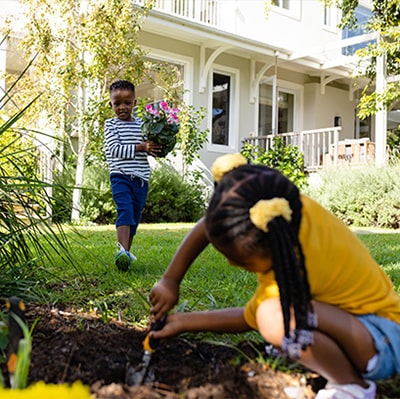How to Repel Gnats in Your Home or Garden
- Details

Although they’re tiny, gnats can cause a great deal of annoyance. Knowing how to deter them and manage ongoing infestations can help keep your home more comfortable. When you know how to identify and tackle gnat infestations, it can help prevent being pestered by these flying insects.
Gnats are tiny and typically don't bite or spread disease, with a couple of exceptions, which we will also examine here. They can multiply quickly, so it's important to address this before an infestation escalates. The first step to combating gnats is to know what species are buzzing around your home or garden.
Types of Gnats and Identifying Factors
When you know what type of gnats you’re dealing with, it can be easier to prevent them. At first glance, they may look the same since gnats have a general overall appearance, but there are some varying characteristics. These are the most common gnats you’ll typically find around homes and gardens.
Fungus Gnats
Fungus gnats are common around potted plants as they seek moist potting soil and feed on decaying roots and fungi. They are dark insects with a mosquito-like appearance and are only about ⅛ of an inch long. If you see them inside around plants, consider letting the top of the soil dry and water plants from the bottom.
Eye Gnats
Commonly seen around sandy, well-drained soil or freshly plowed outdoor areas, eye gnats are grey or black and have an orange tint to their legs. They get their name because they are known to hover and sometimes land in the eyes. Although they don’t bite, they can spread bacteria that cause pink eye if they get in your eye. If they are prevalent in your yard, wearing glasses outdoors can help protect your eyes from contact with these gnats.
Buffalo Gnats
If you’re being bugged by a small insect that looks like a fly but is much smaller, it could be a buffalo gnat. These tiny pests can be troublesome for humans and animals, causing painful bites that sometimes leave a red, swollen mark. They are most common outdoors and tend to avoid interior spaces. Hiring a professional pest control service to treat your yard can help with prevention.
Maintain Your Home and Garden to Deter Gnats
Maintaining an environment that isn't appealing to gnats requires specific but achievable steps. Gnats are drawn to particular types of food, certain smells, moist planting soil, and decaying yard debris. When you take action and are proactive, it can save you lots of time and frustration. Follow these essential steps to deter gnats.
1. Address Any Moisture Issues
Don't overwater indoor plants and be sure your soil has good drainage, especially in potted plants. Fix any plumbing leaks in your home and use a dehumidifier in damp areas like basements and bathrooms. In outdoor areas, remove decaying leaf debris and any rotted wood to avoid an inviting environment for gnats.
2. Switch Out Light Bulbs
Because gnats and other flying pests are attracted to bright lights, the wrong light can lead to swarming gnats in your outdoor space. Replace your outdoor bulbs with yellow bug lights. Bugs have a limited vision spectrum, so they have trouble detecting warm tones. Switching to yellow light bulbs will make it difficult for them to register the light.
3. Maintain and Relocate Water Features
Gnats will often swarm near standing water, so place any outdoor standing water features (such as bird baths or fountains) far from your house. Make it a point to keep them as clean as possible to further deter gnats from making these areas a breeding ground. Regularly scrub away any algae or accumulated debris and freshen the water routinely. In addition, these tips to deter mosquitoes will also help minimize gnat infestations.
4. Store Food and Drinks Properly and Maintain Kitchen Areas
It’s not uncommon to spot a few fruit flies or gnats around countertops where you keep fruit, but these few can quickly become an infestation. Store food and sweet beverages in the refrigerator, especially ripened fruits. Smells from decaying food and sticky drinks are irresistible to gnats and other insects. Wipe down counter spaces where food or beverage residue has spilled, and routinely clean dishes and your kitchen sink, including the drain.
When to Call in Professional Pest Control Services
While DIY methods can minimize your pest problems, there are times when professional pest control services are necessary. If you notice a severe infestation that persists despite your best efforts, it's time to call in the experts. A pest control service has the tools and expertise to tackle large or stubborn gnat populations.
Addressing the root cause of the infestation and a plan for preventive measures tailored to your pest concerns is key for ongoing pest control. Don't hesitate to seek professional pest services before the situation becomes overwhelming. Contact Eagle Pest Services at (866) 281-1822 or complete our pest services form to schedule an inspection.





